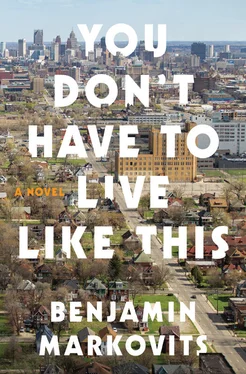“That’s not what I’m talking about. You’re holding back on me. What you’re saying to me is, watch your step. You can go this far but no farther.”
“Are we talking about what I think we’re talking about?”
“I don’t know. But at some point I want to talk about that, too.”
“Because I thought we were talking about Dwayne Meacher.”
“Okay, all right.”
“Tell me this then. How come it took three minutes for the cops to come and twenty-three minutes for the ambulance to arrive? Let’s talk about that.”
“But Gloria, you’re mixing everything up. I don’t know why the ambulance took so long, but that’s not Tyler Waites’s fault. That’s not my fault. But you’re acting like it is.”
“That’s right,” she said. “ Because you taking his side. And don’t speak to me like that again, not now, not ever. Tell me I’m mixing — things up. Get out of my sight and don’t come back till I’ve calmed down.”
“How will I know that you’ve calmed down?”
“Because I won’t throw something at you when I see you.”
SOME FACTS STARTED TO EMERGE about Dwayne Meacher, too. He was a junior at Macomb, another 4A high school, and a basketball rival of Kettridge. A solid B student, he played trumpet in band, which is what I used to play. His father was serving a fifteen-year sentence for voluntary manslaughter at the Mound Correctional Facility — he got in a bar fight and killed someone with a bottle. Dwayne lived with his mother and three sisters. His mother had medical issues and didn’t work; she was described in the papers as a former nursing assistant. One of the sisters was quite a lot older and studying health care administration at Wayne State. The other two were still at home.
The principal at Macomb, Dr. Selena Brown, characterized Dwayne as “kind of a nerdy kid, but popular, a tech-head.” But he had a history of extracurricular “issues.” She had to keep the police from intervening when Dwayne got caught selling prescription painkillers to his classmates. He agreed to do forty hours’ community service, at a substance abuse treatment program, which meant in practice visiting people in prison and going around with one of the caseworkers to make sure guys on parole showed up for their drug tests. His caseworker described him as “always very punctual and respectful, pleasant to be around, a nice kid.”
It probably wasn’t the first phone he stole either. iPhone theft was getting to be a problem downtown. There was a much-mocked op-ed column in the Free Press called “Why Stealing a Phone Isn’t Just Stealing a Phone.” The point of the piece was to explain why people got so attached to their phones. “It’s where you keep not only your bank details but your text messages and your photographs of family and friends. It isn’t just a technological gadget or status symbol. It’s your home, it’s where you live.” But the truth is, as one police officer said, “These gangs aren’t interested in your bank details, and they don’t care about your photographs either. They wipe the instruments clean and ship them to Africa. The phone Meacher stole has a street value of about fifty bucks. Fifty bucks is what he was after, that’s what the risk was for.”
There were daily reports in the paper and on the news of his condition, which didn’t change — critical but stable.
Afew weeks after this incident Robert James called me up and said, “It’s getting nice out, let’s go for one of our Sunday jogs.” But this time he didn’t mean Belle Isle. He wanted to run around city streets, he wanted to see the neighborhood.
We worked up a sweat together and afterwards sat down at one of Joe’s front tables to cool off. Joe himself came out to serve us, in a bright yellow apron.
“I know who you are,” he said to Robert. “I’ve seen you on TV.”
“That’s me.”
We sat there for a good hour while the sweat dried, drinking ice water and then coffee and eating Danishes.
“You’re not around much these days,” I said.
“No, I’ve been in New York.”
There was something about the way he spoke I always found attractive. He thought about everything he said, even basic things like that, and came out with them slowly.
“You washing your hands of us?”
“I’m in and out. I’m in now. I’ve got a lot of things going on that need attention.”
“But you’re here now because of this Meacher business.”
“That’s part of it,” he said. “I want to hear what you think.”
We talked about Meacher and eventually I said, “What happened with Obama, by the way? I’ve been meaning to ask you.”
“What do you mean?”
“I got the feeling there was some bad blood.”
He frowned a little, in a good-looking way. “I wanted to let him know that what we were doing in Detroit could be reproduced.”
“So now he knows.”
“That’s right.”
Kurt Stangel walked over with a Frisbee in his hand. His T-shirt had a picture of Mel Lozano on it, in a sports bikini. Robert put up with him for a while, then when Kurt went inside to get coffee Robert said to me, “Listen, Marny. I’ve got a favor to ask you. You’re friendly with a guy named Nolan Smith?”
“Who told you that?”
“Tony told me. Is it true?”
“I know Nolan.”
“The thing is, he’s starting to cause us a little trouble.”
“Oh, Nolan’s all right. He just talks a lot.”
“Well, now he’s talking about Meacher. There’s a criminal process, which I’m not especially worried about. But Smith is talking to his family, too, he’s making promises to the mother which I don’t suppose he’ll be able to keep. There’s going to be a civil suit, which we expected, but Smith seems determined to make it into a public event, which won’t necessarily help their case.”
“What do you care?”
“I have a duty to the people who come here. .”
“Come off it, Robert.”
“What’s happening right now to Tyler Waites is ninety percent to do with the situation we put him into.”
“So far as I can tell, Tyler Waites is doing fine.”
“That’s because you haven’t thought very much about what this kind of public legal process can do to you.”
“It’s Dwayne Meacher I’d be more worried about if I were you.”
“I am worried about him. The people who really lead the field in brain trauma are the US military, but there are good people in private practice, too, who work closely with the military, and I’ve brought them in on it.”
“I haven’t seen anything about it in the papers.”
“I didn’t want it in the papers. But if you’re willing to talk to Nolan Smith about what’s going on, we can fill you in.”
“Why don’t you tell him yourself?”
“We’ve tried. There’ve been some misunderstandings.”
“Robert, I don’t want to be your middleman. Anyway, there’s not much I can do. He’s been looking for a chance like this for a while.”
“Tony tells me you’re pretty good friends. He says your girlfriend’s an old friend of his, too.”
“That’s enough of that,” I said.
“Marny, I don’t think you appreciate how delicate our position is. In Detroit generally. We really don’t want to turn this into a racial thing.”
“It is a racial thing.”
We sat in silence in the spreading sunshine for a few minutes. The reflection off the metal tables was bright enough to make me squint; salt kept getting in my eyes. But it was nice to dry up in the sun, I felt good.
“What happened with you and Obama?” I said. “Is this the kind of thing he was worried about?”
Читать дальше












